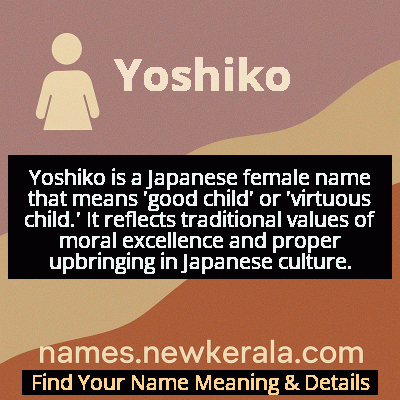Yoshiko Name Meaning & Details
Origin, Popularity, Numerology Analysis & Name Meaning of Yoshiko
Discover the origin, meaning, and cultural significance of the name YOSHIKO. Delve into its historical roots and explore the lasting impact it has had on communities and traditions.
Name
Yoshiko
Gender
Female
Origin
Japanese
Lucky Number
3
Meaning of the Name - Yoshiko
Yoshiko is a Japanese female name that means 'good child' or 'virtuous child.' It reflects traditional values of moral excellence and proper upbringing in Japanese culture.
Yoshiko - Complete Numerology Analysis
Your Numerology Number
Based on Pythagorean Numerology System
Ruling Planet
Jupiter
Positive Nature
Optimistic, inspirational, and creative.
Negative Traits
Scattered, exaggerating.
Lucky Colours
Yellow, gold, purple.
Lucky Days
Thursday.
Lucky Stones
Yellow sapphire.
Harmony Numbers
1, 2, 9.
Best Suited Professions
Arts, writing, communication.
What People Like About You
Creativity, optimism.
Famous People Named Yoshiko
Yoshiko Ōtaka
Spy and actress
Famous Japanese spy known as 'Eastern Mata Hari' during WWII
Yoshiko Yamaguchi
Actress and politician
Celebrated actress who became a member of Japanese Diet
Yoshiko Kuga
Actress
Influential Japanese film actress of classic cinema era
Yoshiko Sakakibara
Voice actress
Prominent anime voice actress with decades-long career
Name Variations & International Equivalents
Click on blue names to explore their detailed meanings. Gray names with will be available soon.
Cultural & Historical Significance
Extended Personality Analysis
Individuals named Yoshiko are often associated with characteristics that reflect their name's meaning of 'good child.' They typically exhibit strong moral integrity, reliability, and a natural inclination toward kindness and consideration. These traits often manifest as conscientiousness in both personal and professional contexts, with Yoshikos being known for their dedication to responsibilities and commitment to maintaining harmonious relationships. The name suggests someone who values tradition while adapting to modern circumstances, creating a balance between respect for established values and practical problem-solving. Many Yoshikos develop a quiet confidence that comes from living according to their principles, often earning them respect as stable, trustworthy individuals in their communities. Their 'goodness' is not passive but active - demonstrated through consistent ethical behavior, emotional intelligence, and the ability to navigate complex social situations with grace and wisdom. This combination of traditional virtue and contemporary adaptability makes them valued friends, family members, and colleagues.
Modern Usage & Popularity
In contemporary Japan, Yoshiko is considered a classic, somewhat traditional name that has decreased in popularity since its mid-20th century peak but maintains steady usage. While it no longer ranks among the most popular names for newborn girls, it continues to be chosen by families who value traditional Japanese names and cultural heritage. The name is experiencing a mild resurgence as part of the retro naming trend, where parents select names from their grandparents' generation to honor family history and cultural continuity. Internationally, Yoshiko remains a distinctly Japanese name that is sometimes selected by parents of Japanese heritage living abroad who wish to maintain cultural connections. The name's current usage patterns reflect broader societal shifts in Japan toward more modern, international, or unique names, yet Yoshiko persists as a respected choice that conveys cultural depth and traditional values in an increasingly globalized world.
Symbolic & Spiritual Meanings
Symbolically, Yoshiko represents the Japanese cultural ideal of cultivated virtue and moral beauty developed through proper upbringing and personal discipline. The name embodies the concept that true goodness is an achievement rather than an innate quality, reflecting traditional Japanese philosophies that emphasize moral cultivation as a lifelong journey. The combination of 'yoshi' (good/virtuous) with 'ko' (child) creates a powerful metaphor for human potential - the idea that every individual carries the capacity for moral excellence that can be nurtured through education, family influence, and personal effort. In a broader cultural context, Yoshiko symbolizes the importance of character development in maintaining social harmony and the belief that personal virtue contributes to collective well-being. The name carries echoes of Confucian values that have influenced Japanese society, particularly the emphasis on filial piety, moral integrity, and the development of refined character as essential components of a meaningful life.

